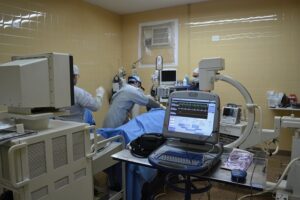ARDS and Prolonged Hospital Stays: Long-Term Care Considerations
ARDS and Prolonged Hospital Stays: Long-Term Care Considerations
Acute Respiratory Distress Syndrome (ARDS) is a life-threatening condition characterized by the rapid onset of respiratory failure. It can dramatically alter the course of a patient’s life, particularly when prolonged hospital stays become necessary. The ambiguity surrounding ARDS can be alarming not only for patients but also for family members and caregivers. Understanding ARDS, its implications, and the long-term care considerations is vital for everyone impacted by this condition. This article aims to shed light on ARDS and the accompanying challenges associated with prolonged hospital stays, while also offering guidance regarding long-term care after discharge.
Understanding ARDS
ARDS is primarily a clinical diagnosis characterized by acute onset hypoxemia, bilateral pulmonary infiltrates, and often a precipitating cause such as sepsis, pneumonia, or trauma. The underlying pathophysiology involves damage to the alveolar-capillary membrane, leading to inflammation, fluid accumulation in the lungs, and impaired oxygen transfer. This can result in varying degrees of respiratory failure and may require mechanical ventilation for support.
Despite the serious nature of ARDS, survival rates have improved due to advances in critical care medicine. However, survivors frequently report a range of physical, cognitive, and psychological issues long after leaving the hospital. Prolonged hospital stays can compound these effects, leading to further challenges that necessitate comprehensive long-term care planning.
- Defining ARDS and its Clinical Features
- Pathophysiology: How ARDS Develops
- Survival Rates and Prognosis for Patients with ARDS
The Impact of Prolonged Hospital Stays
When patients experience ARDS, they may spend weeks or even months in the Intensive Care Unit (ICU), which can significantly affect their physical and mental well-being. Prolonged immobility can exacerbate muscle atrophy, increase the risk of infections, and lead to prolonged mechanical ventilation and resultant complications. Moreover, exposure to the ICU environment can introduce psychological issues such as depression, anxiety, and post-traumatic stress disorder (PTSD).
Family members are often left managing an emotional rollercoaster while trying to support their loved one in a hospital setting. Navigating complex medical decisions and the uncertainty of recovery fosters anxiety that may persist even after discharge.
- Physical Challenges: Muscle Deconditioning and Weakness
- Psychological Effects: Anxiety, Depression, and PTSD
- Family Considerations: Emotional and Practical Challenges
Long-Term Care Considerations
After leaving the hospital, ARDS survivors face unique long-term care needs, requiring comprehensive follow-up strategies to optimize recovery. Both caregivers and healthcare providers must work collaboratively to create tailored care plans. This section covers critical components of long-term care, including rehabilitation, follow-up medical appointments, mental health support, and nutritional considerations.
Rehabilitation Services
Physical rehabilitation is a cornerstone of long-term care for ARDS survivors, focusing on restoring strength, endurance, and functional mobility. This usually begins while the patient is still in the hospital and continues during and after discharge. Key rehabilitation services may include:
- Physical Therapy: Targeting mobility and strength through tailored exercise regimens.
- Occupational Therapy: Assisting survivors in relearning daily activities.
- Respiratory Therapy: Enhancing lung function and teaching effective breathing techniques.
Regular Medical Follow-Ups
Frequent follow-up appointments with primary care physicians and specialists are essential for monitoring respiratory function, managing underlying causes, and identifying any complications related to previous ventilation or ICU care. Follow-up evaluations should ideally include:
- Pulmonary Function Tests: Assessing lung capacity and function post-discharge.
- Cardiopulmonary Evaluations: Addressing issues such as pulmonary hypertension or heart complications.
- Ongoing Prescription Management: Adjustments to medications, including corticosteroids, bronchodilators, and antibiotics if required.
Mental Health Support
As mentioned, ARDS patients may experience significant psychological distress. Mental health services should be integrated into long-term care planning. Family therapy, individual counseling, and support groups can provide critical networks of understanding and communication.
- Therapeutic Interventions: Cognitive Behavioral Therapy can help address anxiety and depression.
- Support Groups: Connecting with other ARDS survivors can foster a sense of community and shared experiences.
- Stress Management Techniques: Mindfulness-based practices may benefit emotional well-being.
Nutritional Considerations
Nutrition is frequently overlooked yet plays a vital role in recovery for ARDS survivors. A diet rich in proteins, vitamins, and minerals can enhance the healing process, particularly concerning muscle recovery and immunity. Key nutritional strategies may include:
- High-Protein Diets: Essential for repairing tissues and rebuilding muscle mass.
- Hydration Management: Ensuring adequate fluid intake to maintain pulmonary function.
- Individualized Meal Plans: Tailoring dietary needs and restrictions based on pre-existing conditions.
Frequently Asked Questions (FAQs)
1. What is the risk of developing ARDS?
The risk of ARDS increases with certain factors, including pneumonia, sepsis, trauma, and chronic illnesses. Early detection and treatment can help mitigate risks.
2. How long does recovery take after ARDS?
The recovery timeline can vary significantly, with many survivors taking months to regain strength and lung function. Ongoing rehabilitation is essential for optimal recovery.
3. What are common long-term effects associated with ARDS?
Survivors may experience chronic lung problems, muscle weakness, cognitive impairments, and emotional difficulties. Comprehensive follow-up care is crucial for managing these issues.
4. Are there any resources available for caregivers?
Yes, many organizations provide support to caregivers, including resources and training to better understand ARDS and its impacts. Organizations like the ARDS Foundation and local respiratory disease associations are excellent starting points.
Conclusion
Understanding ARDS and the implications of prolonged hospital stays is essential for patients and their families. The complexities of ARDS demand a comprehensive strategy encompassing rehabilitation, regular medical follow-ups, mental health support, and good nutritional practices. The road to recovery may be long, but with the right support systems in place, survivors can be empowered to improve their quality of life and regain their independence. If you or a loved one are affected by ARDS, reaching out to healthcare professionals and support networks is critical in navigating this challenging journey.
For additional resources and information on ARDS, consider visiting reputable organizations such as the following:
About ARDS and Post-ARDS
ARDS (Acute Respiratory Distress Syndrome) is a life-threatening condition typically treated in an Intensive Care Unit (ICU). While ARDS itself is addressed during the ICU stay, recovery doesn’t end with discharge; patients then embark on a journey of healing from the effects of having had ARDS.
Disclaimer
The information provided in ARDS Alliance articles is for general informational and educational purposes only and is not a substitute for professional medical advice, diagnosis, or treatment. While we strive to present accurate, current information, the field of Acute Respiratory Distress Syndrome (ARDS) and related healthcare practices evolve rapidly, and ARDS Alliance makes no guarantee regarding the completeness, reliability, or suitability of the content.
Always seek the advice of qualified healthcare professionals with any questions you may have regarding a medical condition. Never disregard professional medical advice or delay seeking it because of information you read in ARDS Alliance articles. ARDS Alliance, its authors, contributors, and partners are not liable for any decision made or action taken based on the information provided in these articles.
About ARDS Alliance
Our mission is to improve the quality of life for ALL those affected by ARDS.
The ARDS Alliance is a non-profit committed to raising awareness and enhancing the understanding of Acute Respiratory Distress Syndrome (ARDS), a severe lung condition often occurring in critically ill patients. Through developing alliances, it unites various organizations and experts striving to improve care and support research aimed at finding more effective treatments. Their efforts include educating the public and healthcare providers about ARDS symptoms, risk factors, and advancements in treatment, ensuring better patient outcomes and resource availability.

I am committed to improving the lives of those affected by acute respiratory distress syndrome. Our organization provides resources and support to patients, families, and healthcare professionals. Together, we work towards raising awareness and advancing research in order to find better treatments and ultimately a cure.
~ Paula Blonski
President, ARDS Alliance





